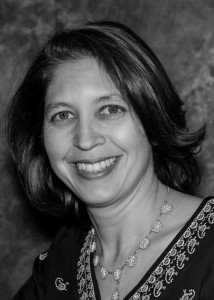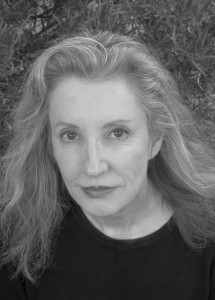At The Muse and the Marketplace writers’ conference earlier this month, I enjoyed an historical fiction panel featuring several authors, including debut novelist Anjali Mitter Duva. Bret Anthony Johnston, author most recently of the brilliant novel Remember Me Like This, offered these words about Anjali’s book: “Faint Promise of Rain is a gorgeous book, a story that is at once spare and lush, wrenching and restoring. The characters are so fully realized, so keenly nuanced, that they linger with you long after the last page, like the sweet smell of a recent storm.”
VP: It was great meeting you at The Muse and Marketplace in Boston. I gather you’ve been involved with Grub Street for some time. What have you gained from being part of a writers’ organization? How has it helped you as a writer?
AMD: I owe so much to Grub Street. Honestly, the workshops, the instructors, the camaraderie I gained from that organization are what enabled me to take the leap and turn my writing into more than just a hobby. In 2007, I took my first workshop at Grub. It was Lisa Borders’ ten week Novel in Progress class. There were twelve of us, all writing our first novels, all doing so while juggling jobs, children, life. I was mid-way through my first draft, just starting to admit to myself I was writing a book. That summer was my first experience in showing my writing to perfect strangers, people knew nothing about me, and very little about the setting of my book, 16th century India. It was a tremendously validating experience. Of course my chapters needed work, but the class, and the instructor, genuinely enjoyed and admired many aspects of my writing, and provided tremendously helpful feedback. They made me believe I could do this.
When the class ended, I was afraid to lose the camaraderie and the feedback. It turned out I wasn’t the only one. I’d hit it off with another participant, Crystal King, writer of historical fiction set in Rome, and we decided to continue to meet, on our own. That was the start of a fabulous writing group that grew to include two more members, Jennifer Dupee and Kelly Robertson. We have been meeting every two weeks for seven years now, and we go on an annual writing retreat in June. These women have become dear friends, and have seen me, and supported me, through the entire writing and publishing journey. And I met them all through Grub Street classes.
Then there’s the annual conference, The Muse and the Marketplace. I met my agent there in 2010—in fact, that year I met two agents who both offered to represent me—and for the past two years I’ve been honored to be a presenter as well as an attendee. The conference is like a shot of writing adrenaline for me. I get to let go of all my other responsibilities, immerse myself with my “tribe” of literary folks, meet up with old friends, make new ones, learn from craft and business pros, and now, share some of my own learnings. I feel very fortunate to be writing in the Boston area, where there’s such a strong literary community.
PHOTO: Penny Lennox
VP: Your novel, Faint Promise of Rain, is set in Rajasthan in 1554. How did you decide to write a novel set in India?
AMD: I am half Indian, and grew up going regularly to India. In 1985 we lived there for a year, and traveled a lot. One of our destinations was Rajasthan, a desert state in the Northwest part of the country. It is a magical place, truly. Citadels and temples rise out of the sand, the sky is a searing blue, the textiles are jewel-toned, the history is colorful and full of legend. When I returned there with my husband in 2001, I felt that magic again, and I knew I needed to set a story there.
That year, I also began my study of kathak, one of the classical dance forms of India. Kathak is a storytelling art, and its history parallels that of India. With origins as a devotional dance practiced in Hindu temples, it was brought into Muslim courts and became an entertainment art under the Mughal Empire. It flourished, in part in courtesan circles, until the British outlawed it in the 1860s. After some decades underground, it resurfaced as India resurrected its national arts during its struggle for independence. Today, it’s a dynamic, mesmerizing art form performed on stages around the world.
What I learned through studying the dance and co-founding a non-profit dedicated to it led to a desire to write about it. And as a branch of this art form has roots in Rajasthan, there it was: the story I wanted to write had found me. I set Faint Promise of Rain during a time of transition in Rajasthan, at the start of Muslim rule in India, and am now working on Book 2, which takes place at the end of the Mughal Empire and the start of British rule.
VP: Was it very difficult to research such an early time period, or did you find it liberating to write a story set so long ago?
AMD: It was, as you suggest, rather liberating. I did a lot of research, of course, but there’s not very much written about that period of time in Jaisalmer, the town in which the story is set. I did a lot of reading about that time period in general, about the Mughal Empire, about the legends and myths relevant to that part of the world. Part of my research had already been done by the time I started writing: my visits to Jaisalmer. The images and impressions of the city were vivid in my mind, and the fact that it is a historic site and very protected means that not much has changed, physically, inside the citadel. No cars are allowed, very little construction is possible. If you remove the cell phones and power lines, the city looks much the way it did 500 years ago. Much of my research ended up being about the dance itself, including the kinetic experience of studying it, being on the dance floor, learning the movements. What was most difficult was ensuring that I had the fauna and flora right; that I didn’t use expressions or words that had not been coined at the time, that type of thing. But with access to so much via Internet, all this is feasible.
VP: You’ve done a great job of sharing your novel with a broader audience. Can you offer suggestions to writers at the beginning of their publishing journey?
AMD: Anyone who publishes a book these days undoubtedly learns a lot. My main advice to pass on to writers just beginning their journey is this:
“To thine own self be true,” as Polonius tells Laertes in Hamlet. Write the story you want to write, how you want to write it. Seek out the publishing experience that makes the most sense for you and for your personality, be it traditional, partner publishing, self-publishing. Don’t do things just because you feel pressure that you “should.” Focus on activities that give you energy, and try to avoid those that suck it away.
Think creatively. There are a lot of new opportunities out there, for publishing, for marketing. Those who get noticed, other than producing great work of course, are those who break the mold a bit, do things that people don’t expect.
Become a part of a literary community, and be a literary citizen—through classes, with a writing group, by attending literary events, by supporting other writers, by buying from bookstores. There is tremendous energy and inspiration to be gained through this, and in addition to benefiting the entire community, these activities help build a writer’s network. And as any newly published author will tell you, a network is key.





